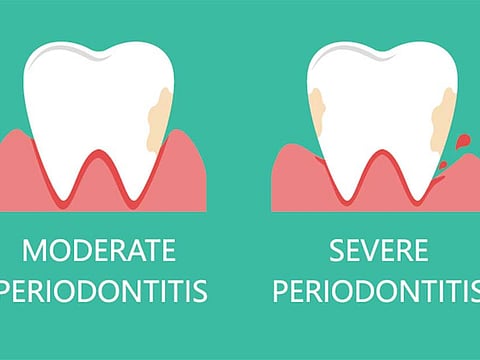A better life with diabetes
Commit yourself to a dental health action plan to avoid complications

Diabetes is a chronic disease with the potential to affect all organs and organ systems. Among the complications are teeth cavities and gum disease, with the risk of loss of teeth. About 20 per cent of diabetics suffer from periodontal disease. Pregnant diabetic women are at a particular risk for this complication — remember the saying every pregnancy costs a tooth.
Our saliva usually contains bacterial flora. Starches and sugar in food and beverages interact with these flora and form plaque on the surface of the teeth. Acids in the plaque attack surrounding tissue and lead to gum disease and cavities. The higher the blood sugar level, the greater is the concentration of sugar and starches in the saliva. This again leads to a higher probability and severity of the onset of gum disease.
Dental complications
If plaque is not removed with regular brushing, plaque will harden under the gum line and build calculus. This irritates the gingiva. Over time, the gum gets swollen and bleeds easily; we call this gingivitis.
Periodontitis: if left untreated, gingivitis can lead to a more serious infection, destroying the soft tissue and bone that support the teeth. Eventually, periodontitis causes the gum and jawbone to pull away from the teeth, which in turn causes the teeth to loosen and possibly fall out. Severe periodontitis on the other side may cause blood sugar levels to rise, which makes diabetes more difficult to be controlled. A vicious circle begins with the risk of loss of teeth.
Increased blood sugar levels in the saliva promote building of plaque. Acids in the plaque attack surrounding tissue and lead to cavities.
Signs of periodontitis
Red, swollen gums that bleed easily
Gums pulled away from teeth, let them appear longer
Pus between the teeth when the gums are pressed
Constant bad breath and/or bad taste in the mouth
Teeth becoming loose
Dental health action plan
Rigorous commitment to diabetic management is the most important factor to avoid dental complications. Take your medication to control blood sugar, cholesterol and blood pressure, refrain from smoking and change to a healthy lifestyle with regular workout and healthy diet.
Use a smooth toothbrush and dental floss
Have annual consultation with your dentist to remove all plaque and treat inflammation and cavities
Amber Clinics invites you to join its Amber Diabetes Registry or Amber Diabetes Patient Education Programme. Its highly specialised interdisciplinary Diabetes Care Team looks forward to taking care of you.
As Amber Clinics considers Diabetes Registry and Interactive Diabetes Education a corporate social responsibility, everybody can attend both the programmes free of cost.


